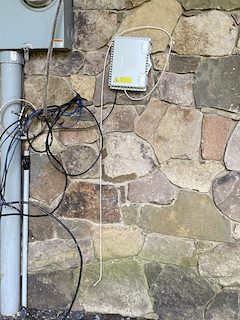
“Internet’s down,” I said to Keith early Wednesday morning, initiating problem solving. All indicators showed connection, but the browser—as here—said otherwise. Keith rebooted the system but to no avail. So, I used my phone to email Firefly—to establish a written record—then called customer service. The representative told me to unplug their inside box from the power source, wait 30 seconds, then plug it back in. Nothing. “Call tech support,” the representative said, which we did. Tech support gave me the number of our service ticket, which would to be acted upon by the next business day.
Lesson Number One: Diagnose the problem
Later, on a hunch, I checked the outside connection. Sure enough, the wire had been severed—see below. I called tech support to update the ticket information.

Lesson Two: Contact the people who can help
Remember our “dangerous tree” at the foot of out driveway, which I wrote about last week? Response to my email (with a picture) to the power company was less than five minutes. The tree was “escalated” to the forester, who left me a phone message two days later, saying they’d put the tree on their schedule for the following week. The tree was down ten days after my initial contact.
Our experience with Firefly was a little different. My early Wednesday morning email, answered by “Support” on Thursday morning, told me to contact tech support. Since I’d already done so, I provided the ticket number. “Support” wrote, “We will have a line tech out this afternoon.”
Except nobody came.
Lesson Three: Monitor the “escalated” situation
I called tech support at 4:30pm on Thursday and was assured someone would be there. No one came or called. I contacted tech support again before 6:30pm, now after hours. Baffled by the situation, the on-duty tech read from a script with words like “escalate” and “protocol.” Apparently, there had been an outage in the area, and everyone thought that by resolving that issue, our problem would be solved, too.
Amid the tech’s verbiage, I heard, “That ticket has been closed.”
“Wait. What? Our ticket has been closed? We’re still out and nobody came or called.” When the poor tech support guy began to read from the script again, I interrupted. “Please, stop. The words ‘escalate’ and ‘protocol’ are meaningless. What do we need to do to solve the problem?” He made out a new ticket and gave me the number. “Thank you, I will expect a line tech here tomorrow morning,” I said.
Sure enough, at 9:15 on Friday morning, the Firefly service tech pulled up to the house in a full-fledge line truck. He immediately diagnosed the problem—mice—and repaired the line.
Lesson Four: Implement prevention
The line tech said he’d been seeing a lot of chewed wires recently. With temperatures cooling, mice are looking for dark, secluded places to nest; circuit boxes and cars are favorites. Since wire insulation produces an appetizing aroma, they satisfy a rodent’s desire to chew and gnaw.
How to deter mice and prevent damage? Seal entry points, park cars in sealed garages, and run the vehicle regularly. Also, rodents don’t like the smell of Pine Sol or peppermint oil—or human scent—so mark your territory.
Living here on the mountain means constant maintenance: trees, leaves, and critters. With the help of others—our sons last spring—we keep leaves clear from ditches and away from our vehicles—another deterrent.
Speaking of vehicles, the warning lights on our car flashed on again yesterday morning on the way to church, the same combination that led us to replace the catalytic converter. Problem tentatively diagnosed. Early this morning, I called the auto shop—the people who can help—and Keith and I dropped off the car. An hour later, the mechanic called, saying our O2 sensors needed to be replaced, too. Parts should arrive tomorrow, the car ready by the end of the day. I’ll follow up tomorrow afternoon and schedule an oil change and inspection for next month.
Prevention is the best problem solver.



Having just experienced both computer and TV streaming issues, I felt a connection reading your post. I am getting to be an old woman who says give me the simple life without all our new technology. But then I want to keep up with technology so I am not looked at like an old woman who refuses to learn. The best advice I can give myself is keep a sense of humor as I try to stay current. Thanks for sharing your story.
Thank you for your comment, Marianna. I can’t tell you how grateful I am for face-to-face interaction. But technology helps us stay connected – as here. -C.D.
Technology is a blessing . . . when it’s working! I can remember some similar issues when I was teaching in Columbus during my final ten years in the classroom. Carole, I hope you and Keith can enjoy more and stress less.
Thank you, Richard. As far as problems are concerned, I’ve discovered that it’s less about the issues and more about how we handle them. Grace.
So true! Your remark reminds me about the need to sometimes be willing to accept Murphy’s Law.